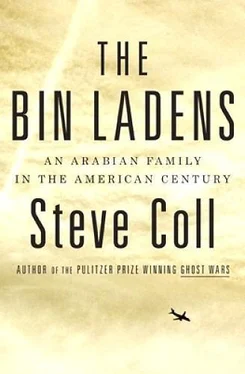He debated with these ulema about the attractions and dangers of modern technology. Through his contacts with the British, Abdulaziz came to understand the outlines of Europe’s industrialization and the dizzying array of products and comforts it had created. He had no desire at all to adapt to European civilization, but its gadgets intrigued him greatly. He never left the Arab world and he mocked English finery and pomposity. During a desert meeting with a British officer, he strode into an elaborate colonial tent outfitted with plush chairs, and announced, “Here we are in modernity! Bring tea, boy!” He urged his robed Bedouin retinue to join him on the carved chairs: “Let’s be modern!” He mocked, but he also imitated: By the 1930s he had ordered his own European furniture for his Riyadh majlis.
He particularly liked radio sets, through which he could follow European news without ever leaving his palace. The Marconi wireless network he began to build on the Arabian Peninsula during the early 1930s also offered an important, even revolutionary means for Abdulaziz to monitor and control events in his own kingdom. He set up radio stations in major cities and a central operations room in Riyadh from where he could track potential rebels on the periphery of his domain and dispatch orders or units of his army. He struggled to persuade Riyadh’s deeply suspicious Islamic scholars that these radio devices were permissible; among other things, the scholars strenuously objected to the music that came on to signal BBC news bulletins. Because it was impossible to anticipate exactly when this music would appear, Abdulaziz persuaded the scholars that the fault was with the radio knobs, not the radios or broadcasts. He also sought to persuade his religious scholars that the telegraph was not a form of sorcery.
Businessmen in Jeddah plied the king with Ford and Chevrolet automobiles, which he used to hunt gazelles in the desert. He would race along in the front seat beside his Bedouin driver, chasing his hunting falcons as they plunged to attack the fleeing antelopes, pecking out their eyes before the men completed the ceremonial kill. Thundering through the rough desert, Abdulaziz ground his cars down quickly and often left them to rust. In 1927 his royal garage had 250 Fords and Chevrolets, and it grew ever larger. 6
The business agent who supplied Abdulaziz with Fords and Marconi radios, and who increasingly infiltrated his court and provided it with an air of burlesque intrigue, was Harry St. John Philby. He had graduated from Cambridge University with a First Class degree in Modern Languages, joined the Indian Civil Service, and later worked in Iraq, but he quit Britain’s colonial service and became increasingly bitter about his government. Still, he desperately wished to be recognized in England as the foremost Arabian geographer and traveler of his time. During the 1920s he attached himself to Abdulaziz as an informal adviser and converted to Islam; the king endowed him with the new name of Abdullah. He was a “stocky, bearded figure in Arab dress, fiercely and fearlessly argumentative, unalterably British and yet more Arab than the Arabs,” one acquaintance wrote. Yet for all his airs, he was “neither a soldier nor a poet…the kind of man who is always out of step.” When not attending the king’s Riyadh court, Philby lived in a comfortable house in Jeddah, where he set up his Ford dealership and collected baboons. 7
Perhaps because Philby was so skeptical about the British government—he was ultimately arrested during the Second World War for promoting the causes of Nazi Germany—Abdulaziz came to rely upon him for independent advice in his dealings with Europeans and Americans. He presented Philby with a slave girl as a gift, and granted him permission to travel across the peninsula, documenting its flora and fauna for books and lectures Philby delivered to English geographers. And it was Philby who controlled the crucial negotiations during the 1930s for mining and oil concessions.
Winston Churchill had converted Britain’s navy from coal to oil during the First World War and by doing so helped usher in the oil age. Britain had locked up supplies in Iran and Iraq, but American explorers had begun to poke around the Middle East as well. An American oil company, SOCAL (Standard Oil Company of California), had the insight to put Philby on its payroll; the company paid him $1,000 a month and promised a bonus of $10,000 if it won a concession from the Saudi king, plus an additional $50,000 in royalties if significant amounts of oil were discovered and exported. Abdulaziz had run up huge debts to Philby by purchasing cars and radios from him, and an oil deal with SOCAL offered not only cash in Philby’s pocket, but a potential revenue stream from which the king could pay off his debts. Philby seemed determined to keep Britain out of Saudi Arabia. The deal he helped to broker, signed with SOCAL in 1933, provided Abdulaziz with 50,000 British pounds’ worth of gold, and the promise of an equal amount if oil was discovered in commercial quantities, plus additional royalties. 8The king displayed little personal interest in oil; he was much more interested in parallel explorations for minerals and especially water. But to finance his enormous family, to quell the peninsula’s tribes and other political rivals, he desperately needed gold.
As soon as he had it, Abdulaziz began to spend it. Like many of the newly wealthy, he and his sons decided that they would enjoy a bigger and finer place to live, and so in Riyadh and just outside its walls, a palace building boom began. At the same time, to the east, along the shores of the Persian Gulf, the Americans had arrived to begin drilling for oil; they began to construct houses, schools, offices, and warehouses.
It was an excellent time and place to be an enterprising young man in the building trades.
A CONSORTIUM called the Arabian American Oil Company, or Aramco, formed to manage the oil rights SOCAL had won. American geologists, drilling engineers, and construction managers settled at Dhahran, about three hundred miles to the east of Riyadh, near the sandy mounds beneath which, it was hoped, the largest oil reserves might lie. The Bedouin nomads who moved through the desert in loose bands, scraping their living from caravan trade and animal husbandry, disdained manual labor. Some did take oil jobs, but they kept their distance from Aramco’s settled camps. Hundreds of other Arabs—local Shia who faced discrimination from the Bedouin, and poor foreign migrants like Bin Laden—eagerly accepted the Americans’ salaried work.
Mohamed Bin Laden traveled to Dhahran from Jeddah and found work with Aramco as a bricklayer and mason. He excelled. His supervisor, a “redneck mason” from the United States, decided that “this guy’s really good,” according to Tim Barger, whose father was an Aramco executive. In a matter of just weeks, Aramco promoted Bin Laden to be foreman of a bricklaying crew. A few months later, they promoted him again to supervise several crews. “He had what it took,” said Barger, who recorded his father’s recollections and later worked in Saudi Arabia. “He was blind in one eye but he knew how to supervise people and get jobs done. Then after a long time—maybe a year or a year and a half—he went to Aramco and said, ‘I want to start my own business.’” It was difficult to bring in Americans to Saudi Arabia to do every little job, from catering to fence repair; therefore, Aramco supported any Arab who showed promise as an independent contractor. “They said, ‘Go on out, get started, we’ll give you some jobs. You can always come back here.’ He got his contracting job going well enough so that he could go to Riyadh and hang out for days and days.” A profile of Bin Laden assembled several decades later by the American government reported that he struck out on his own from Aramco in 1935. 9
Читать дальше












